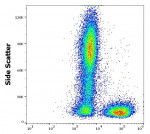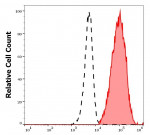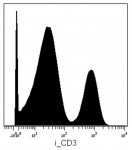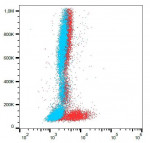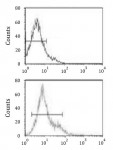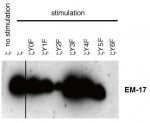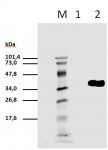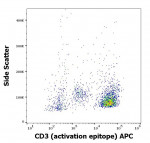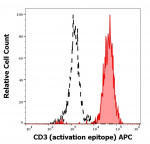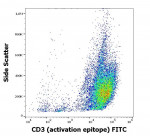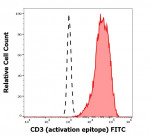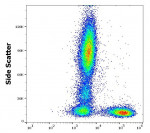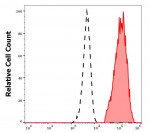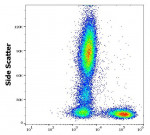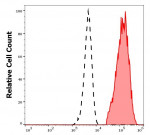Search Result - Primary Antibodies
There are 570 results for "CD3"
- anti-CD3 epsilon antibody [MEM-57]
- Cat. No: ARG62802 (Mouse mAb)
- Reactivity: Hu
- Application: FACS, IP, FuncSt, CyTOF®-candidate
- Specificity: The clone MEM-57 reacts with gamma-epsilon and delta-epsilon dimers of human CD3 complex, a part of a bigger multisubunit T cell receptor complex (CD3/TCR) expressed on peripheral blood T lymphocytes and mature thymocytes.
HLDA IV.; WS Code T 96 - Conjugation: Un-conjugated
- anti-CD3 epsilon (activation epitope) antibody [APA1/1]
- Cat. No: ARG62807 (Mouse mAb)
- Reactivity: Hu, Ms
- Application: FACS, ICC/IF, IHC-Fr, IP, WB
- Specificity: The clone APA1/1 recognizes an activation-dependent intracellular epitope of CD3 epsilon. Exposure of the epitope precedes CD3 phosphorylation and recruitment and activation of ZAP70, which initiates the signaling cascade produced by T-cell activation. APA1/1 provides the earliest known marker for TCR-mediated T cell activation.
- Conjugation: Un-conjugated
- anti-CD3 zeta antibody
- Cat. No: ARG55533 (Rabbit pAb)
- Reactivity: Hu
- Application: FACS, WB
- Conjugation: Un-conjugated
- anti-CD3 zeta phospho (Tyr153) antibody [EM-17]
- Cat. No: ARG65442 (Mouse mAb)
- Reactivity: Hu, Ms
- Application: FACS, WB
- Specificity: The clone EM-17 recognizes phosphorylated tyrosine 153 of CD3 zeta chain (CD247), which is a component of TCR/CD3 complex expressed on T cells.
- Conjugation: Un-conjugated
- anti-CD3 zeta phospho (Tyr111) antibody [EM-55]
- Cat. No: ARG65444 (Mouse mAb)
- Reactivity: Hu, Ms
- Application: FACS, WB
- Specificity: The mouse monoclonal antibody EM55 recognizes phosphorylated tyrosine 111 of CD3 zeta chain (CD247), which is a component of TCR/CD3 complex expressed on T cells.
- Conjugation: Un-conjugated
- anti-CD3 epsilon (activation epitope) antibody [APA1/1] (APC)
- Cat. No: ARG42309 (Mouse mAb)
- Reactivity: Hu, Ms
- Application: FACS
- Specificity: The mouse monoclonal antibody APA1/1 recognizes an activation-dependent intracellular epitope of CD3 epsilon. Exposure of the epitope precedes CD3 phosphorylation and recruitment and activation of ZAP70, which initiates the signaling cascade produced by T-cell activation. APA1/1 provides the earliest known marker for TCR-mediated T cell activation.
- Conjugation: APC
- anti-CD3 epsilon (activation epitope) antibody [APA1/1] (FITC)
- Cat. No: ARG42316 (Mouse mAb)
- Reactivity: Hu, Ms
- Application: FACS
- Specificity: The mouse monoclonal antibody APA1/1 recognizes an activation-dependent intracellular epitope of CD3 epsilon. Exposure of the epitope precedes CD3 phosphorylation and recruitment and activation of ZAP70, which initiates the signaling cascade produced by T-cell activation. APA1/1 provides the earliest known marker for TCR-mediated T cell activation.
- Conjugation: FITC
- anti-CD3 epsilon antibody [OKT3] (low endotoxin)
- Cat. No: ARG62801 (Mouse mAb)
- Reactivity: Hu
- Application: FACS, IHC-Fr, FuncSt
- Specificity: The clone OKT3 recognizes the CD3 antigen of the TCR/CD3 complex on mature human T cells. This antibody, also known as Orthoclone OKT3 or Muromonab-CD3, has been extensively used as a drug for therapy of acute, glucocorticoid resistant rejection of allogenic renal, heart and liver transplants. It has also been investigated for use in treating T-cell acute lymphoblastic leukemia.
HLDA VI; WS Code T6T-R3 - Conjugation: Un-conjugated
- anti-CD3 epsilon antibody [OKT3]
- Cat. No: ARG62804 (Mouse mAb)
- Reactivity: Hu
- Application: FACS, IHC-Fr, FuncSt
- Specificity: The clone OKT3 recognizes the CD3 antigen of the TCR/CD3 complex on mature human T cells. This antibody, also known as Orthoclone OKT3 or Muromonab-CD3, has been extensively used as a drug for therapy of acute, glucocorticoid resistant rejection of allogenic renal, heart and liver transplants. It has also been investigated for use in treating T-cell acute lymphoblastic leukemia.
HLDA VI; WS Code T6T-R3 - Conjugation: Un-conjugated
- anti-CD3 epsilon antibody [MEM-92] (low endotoxin)
- Cat. No: ARG65502 (Mouse mAb)
- Reactivity: Hu
- Application: FACS, IP, FuncSt
- Specificity: The clone MEM-92 reacts with epsilon chain of human CD3 complex, a part of a bigger multisubunit complex of the T cell receptor (CD3/TCR) expressed on peripheral blood T lymphocytes and mature thymocytes.
HLDA IV.; WS Code T 97 - Conjugation: Un-conjugated
